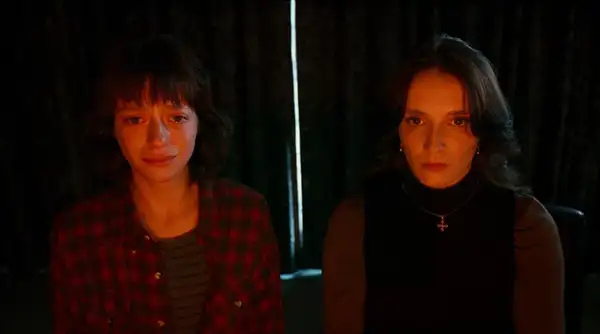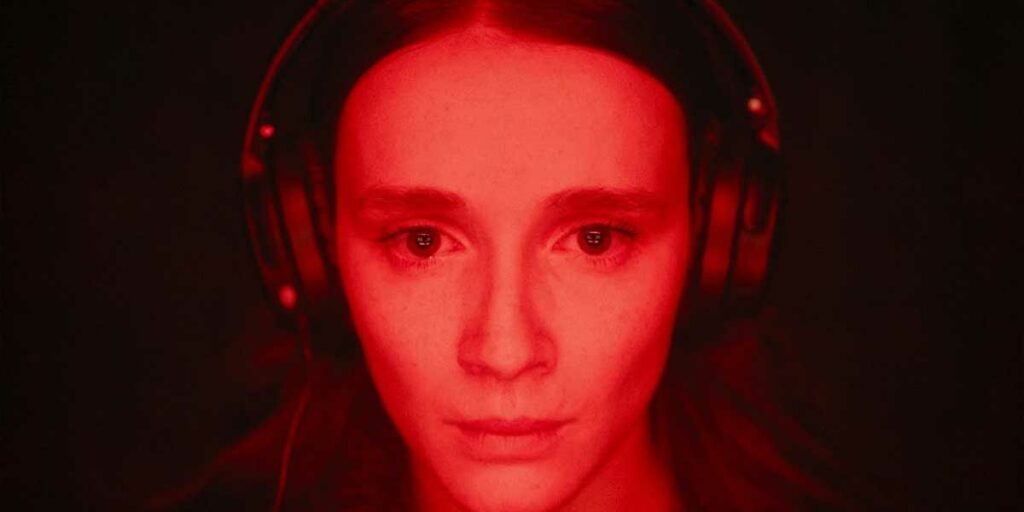Red Rooms‘ understated yet effective approach to storytelling produces one of the most compelling, psychological fictional crime thrillers to-date.
Canadian director and screenwriter Pascal Plante’s latest feature release, Red Rooms (Les Chambres Rouges), has already made quite the impression. During the 27th Fantasia International Film Festival earlier this year, the film racked up three awards for Best Screenplay, Best Score, and Best Feature and continues to gain the attention of audiences. What makes Plante’s latest project so unique and compelling is not only his minimalistic, effective approach to storytelling but also his ability to grip viewers while reflecting on the unsettling subject matter presented, which sticks with you after the film’s close.
At the beginning of Red Rooms, viewers are invited into a Montreal courtroom as accused serial killer Ludovic Chevalier (Maxwell McCabe-Lokos) stands trial for the devastating murders of three girls: Camille, Justine, and Kim. During the prosecutor’s opening statement, she discusses the evidence obtained during the investigation, proclaiming that Chevalier is the man behind the crimes and that he taped the killings in his red room and distributed the footage on the Dark Web.
Among the victims’ families and jurors in the courtroom are two women, Clementine (Laurie Babin) and protagonist, Kelly-Anne (Juliette Gariépy), who have opposing views on whether the defendant committed the crimes. As the weeks pass by and details of the case unfold, the pair strike up an unexpected friendship, though, over time, Kelly Anne’s motives become questionable. Her ease of access to information online and her vast knowledge of the case including viewing footage of the crimes that the public doesn’t have access to, makes Clementine realize over time that her new pal may be in over her head. In addition, Kelly-Anne becomes obsessed with finding a vital piece of evidence that is yet to be discovered.
Gariépy and Babin’s characters couldn’t be more different in their beliefs, but the contrast pairing works as it presents two opposing views on the case. Clementine, though vocal with her opinions and adamant that the alleged serial killer is innocent and was framed, is a warm presence among a feature so full of dread. It’s a breath of fresh air to have her character give moments of relief amidst a story saturated with heavy subject matter. Meanwhile, Kelly-Anne is more of an observer, keeping most of her views to herself. She’s an aloof individual and a hard nut to crack, but her disconnected nature, reflected in a brilliant yet understated performance by Gariépy, makes viewers want to learn more about her and discover what lies beneath.

Red Rooms‘ ability to build such mystery and tension with a minimalistic approach showcases the talent of writer/director Pascal Plante. The feature’s topic is harrowing, but instead of providing each detail over the film’s runtime, Plante trusts that viewers can fill in some of the blanks. At first glance, the film appears to be a courtroom drama, and though Chevalier’s verdict is important, Red Rooms plays out as a psychological thriller that focuses more on Kelly-Anne’s obsession with the case. The film illustrates how a vast majority of society obsesses over true crime cases, with some even glorifying serial killers. From documentaries to YouTube channels to Podcasts, individuals attempt to morph into sleuths to solve high-profile murder cases and are entangled in the mystery that surrounds them. As the minutes of Red Rooms progress, viewers start to see just how consumed by the case Kelly-Anne has become, as the lines between wanting to do the right thing and being immoral become blurred.
Many scenes in the film describe the monstrous crimes committed, and though characters in Red Rooms see some of the footage, much is implied to the audience rather than shown. Instead, Plante reflects the haunting killings through the characters’ facial expressions, with the use of effective lingering shots that create an unsettling atmosphere. In one spine-chilling scene, Kelly-Anne sits in her home while watching a horrifying video on her computer that is linked to the case, though the audience never sees what she watched. In that moment, Plante moves the camera closer to Gariépy’s face as he captures her soul-crashing gaze, which is truly unnerving. The absence of light, except for Kelly-Anne’s computer screen, also brings a generic apartment setting to life.
Similarly, Plante achieves the same captivating effect during courtroom scenes, as the camera zooms in on its subject and captures the emotions each is internalizing, with the absence of dialogue. During other tense sequences, viewers can feel the weight each character is carrying through their demeanor, accompanied by Red Rooms‘ hair-raising score.
Though Red Rooms’ future release in certain countries is unknown, this is a film that should be on everyone’s radar. Plante’s less is more approach delivers an impactful, gripping crime story, and his strong script, fantastic cast performances, and masterful camerawork make the feature one of the best modern-day released psychological thrillers.
Red Rooms was screened at the 2023 Brooklyn Horror Film Festival on October 14, 2023. The film will be released in select US theaters and in UK cinemas on September 6, 2024. Read our review of Where the Devil Roams!

